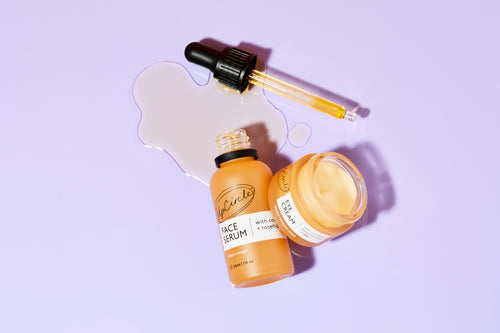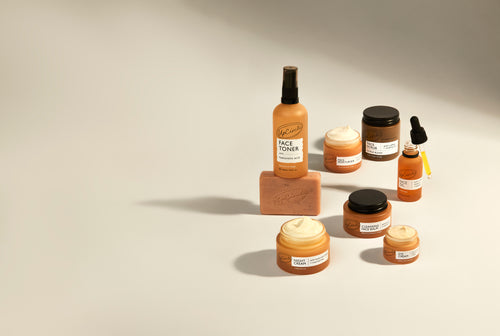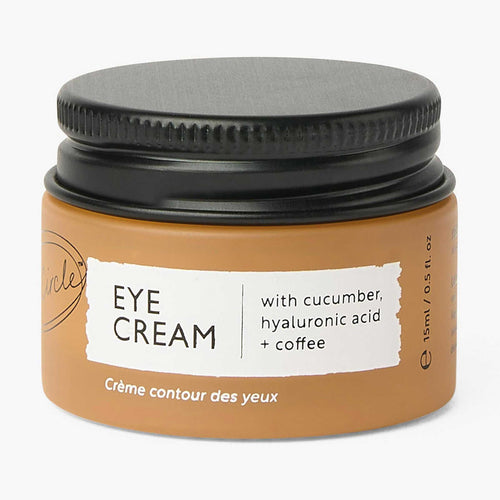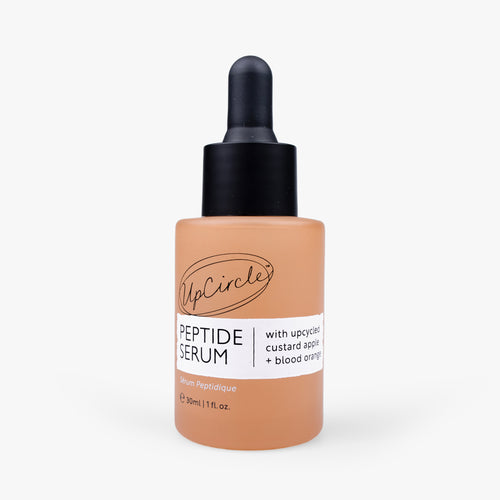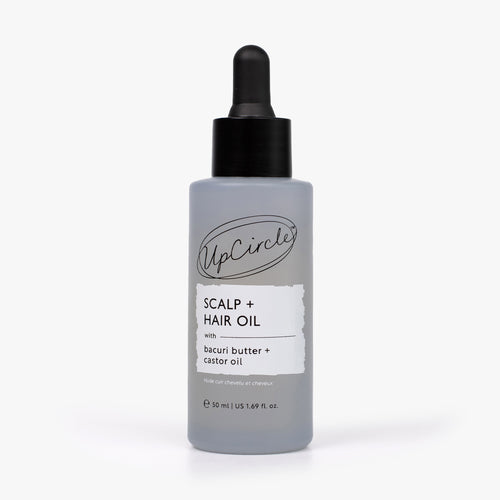Both peptides and collagen are essential for maintaining healthy and happy skin, however, they differ in their structure, function, and applications.
Discover how these ingredients can be used in your skincare routines.
What are peptides?
Peptides are chains of amino acids that naturally occur in the body and serve as the building blocks for proteins like collagen. These proteins, including keratin and elastin, play a crucial role in maintaining the health and vitality of your skin.
Also known as polypeptides, peptides have become a popular ingredient in various skincare products, such as serums and creams. Different types of peptides serve distinct functions, including:
-
Signal peptides: carries information for protein secretion.
-
Carrier peptides: carries specific ingredients.
-
Neurotransmitter peptides: can function as either hormones or neurotransmitters to carry messages to other cells.
As we age, the natural levels of peptides in our bodies decline. Using skincare products enriched with peptides can support the skin in producing vital proteins. These peptides are frequently combined with active ingredients like hyaluronic acid and niacinamide to address specific skin concerns, such as dryness, dullness, and dehydration.
If you want to find out more about peptides for skin, read our dedicated blog.
What is collagen?
Collagen – the most abundant protein in mammals – is essential to the body, making up approximately 30% of the body’s total protein content. Rather than being a single substance, collagen refers to a family of 28 known types, though it is commonly referred to collectively as "collagen" for simplicity.
This protein serves as the primary structural component of the extracellular matrix. This sounds complicated, but it is basically a support network composed of substances like proteins and sugars, found in connective tissues such as skin, bones, cartilage, tendons, and ligaments.
Type I collagen is the most prevalent form in the human body, making up over 90% of the organic mass in bone and around 80% of the skin's structural components. It is most commonly found in the skin, bones, tendons, ligaments, and cornea.
Although the body produces collagen naturally, its production decreases with age. Factors such as excessive sun exposure, smoking, alcohol consumption, and inadequate sleep and exercise can further reduce collagen levels.
As stimulating collagen production is such an important skincare benefit, we dedicated a whole blog to what you need to know about collagen.
Key skincare benefits
1. Both help to repair your natural skin barrier
Both peptides and collagen work to repair and maintain your skin’s natural barrier.
Essential for maintaining your skin’s overall health, your skin barrier can become damaged and depleted due to several different factors. Environmental aggressors such as pollution, UV rays and toxins can compromise the skin barrier. Other stressors such as smoking and stress can contribute to skin barrier damage.
Peptides such as signal peptides stimulate the production of proteins and lipids that are necessary for the skin barrier's repair and regeneration. Whereas collagen plays a critical role in wound healing and tissue regeneration. By supporting the production of new skin cells and the repair of damaged tissue, collagen helps restore the skin barrier when it is compromised.
2. Both promote skin elasticity
Collagen production can stimulate the synthesis of elastin, another essential protein that enhances the skin's ability to stretch and rebound. Peptides are not only able to help stimulate collagen production, but also elastin, allowing the skin to stretch and return to its original shape, contributing to its elasticity.
3. Collagen improves skin hydration
Collagen improves skin hydration through its ability to attract and retain moisture in the skin, as well as by supporting the skin's natural hydration processes. It contains amino acids like glycine, proline, and hydroxyproline that help attract and retain water. This water-binding property enhances the skin's moisture levels, keeping it hydrated and plump.
4. Peptides stimulate the production of collagen
Peptides are the essential building blocks for collagen, which helps to keep your skin moisturised, healthy and supple. As we’ve seen, collagen is important for maintaining the structure of your skin cells and also the texture of your skin.
Peptides vs collagen – which should I choose?
The main difference between peptides and collagen is that peptides are able to stimulate the production of collagen and elastin to improve skin firmness and elasticity.
Peptides work to address specific skin concerns, such as fine lines, wrinkles, hydration, and skin repair. Whereas collagen is primarily used to improve skin texture, hydration, and elasticity indirectly when boosted through peptide stimulation.
Elasticity Boosting Duo
Clinically proven to deliver results within 14 days, our Elasticity Boosting Duo is quickly becoming a fan-favourite. Deeply nourishing, soothing and balancing for the skin, this duo both boosts elasticity and plumps the skin.
Our multi award-winning Face Moisturiser is a deeply hydrating, fast-absorbing face cream that nourishes and soothes skin. Enriched with cocoa butter to nourish, argan to protect, and vitamin E to brighten, this moisturiser is dermatologically approved for all skin types.
The Peptide Serum is formulated with upcycled custard apple and blood orange, as well as biomimetic peptides. The serum is recommended for all skin types, even the most sensitive skin, due to its soothing and anti-inflammatory properties.
At UpCircle, we’re committed to providing quality skin, body and haircare that doesn’t compromise on our values. Upcycling various ingredients into our formulations, we give a new lease of life to ingredients that would otherwise go to waste.

